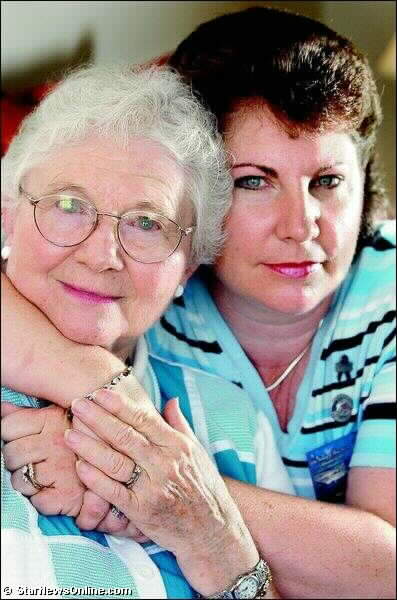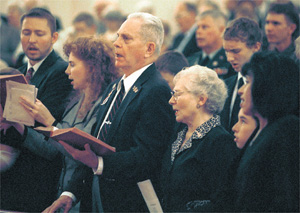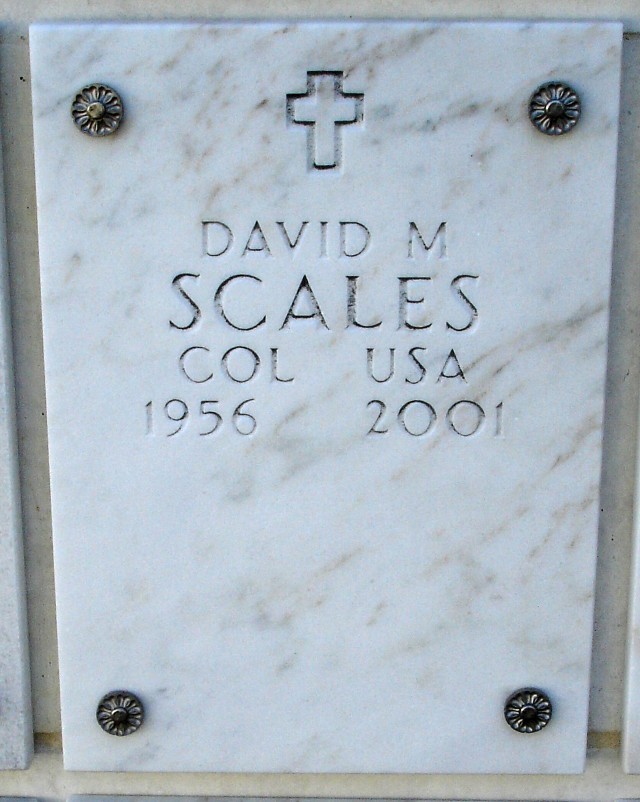13 October 2001
Whenever David Scales visited Court Street United Methodist Church, he played their piano after the service ended. Groups of people would gather around to listen to the concert pianist play his compositions.
Friday afternoon, his music was played again in the church, in his absence.
Colonel David Scales was one of the 189 people who died September 11 in the terrorist attack on the Pentagon in Washington, D.C. His interment was at Arlington National Cemetery on October 11.
More than 100 people attended the “celebration” of Scales’ life, which was held by his parents, John and Dorothy Scales of Lynchburg, Virginia.
“I think every time I saw him he was smiling,” said the Rev. Stan Pigue, who directed the service. “It seemed like when he was around me the air was full of energy and brightness.”
He said David’s life was a gift from God, and survivors should thank God for that gift.
“David Scales lived knowing the gift of life that he had,” he said. “He embraced the gift of God’s grace in his life.”
More than 20 members of the Scales’ extended family sat in front rows of the church, but his friends were the ones who eulogized.
“He was a hero of our nation … and my friend,” said Tom Stewart, who knew Scales for nearly 20 years.
The last time he saw Scales was at a recent wedding in Pittsburgh.
“We spoke about how our friendship was an eternal bond,” since they’re both Christians, Stewart said. “Nothing can separate us from God’s love, and really from each other.”
Bobbi Bliss and Dan Bridges wrote songs and performed with Scales. They were both like Oscar Hammerstein to Scales, who aspired to be like Richard Rodgers.
“When you saw David with his hands on the piano, you couldn’t help but feel that you could hear his heart and soul and spirit,” Bliss said.
Bliss and Bridges sang three songs along with a recording of Scales playing his compositions on piano.
One song that Bridges wrote, entitled “Fly Polyphemus,” was about a beautiful moth he once saw.
It now carries a different message, Bridges said.
“David is now our Polyphemus.”
The song’s chorus is as follows: “Fly Polyphemus/Reach for the sun/One day I’ll join you/When this life is done/I’ll be looking for you/at the rainbow’s end/But I know I’ve lost a friend/’Til we meet again.”
Lisa Watkins, Scales’ sister, said the family had benefited from several days together.
“It’s been a great chance for our family to be together, to offer each other the moral support,” she said. “The time here has been great. This is how I knew David best – at the piano.”
Lt. Col. David Martin Scales
Lieutenant Colonel David Martin Scales of Arlington, Virginia, perished September 11, 2001 at the Pentagon, just shy of his 45th birthday, as a result of the devastating
terrorist attack on the building. He was born Septmber 27, 1956, the son of retired
Captain John B. and Dorothy Scales of Lynchburg.
While in high school in East Liverpool, Ohio, he was a cadet lieutenant in the Junior Reserve Officers Training Corps unit. He graduated from the University of Cincinnati Conservatory of Music with a degree in music theory and composition in 1979 and with a commission in the U.S. Army Reserve as a Second Lieutenant, Medical Service Corps.
As part of his basic officer training, he was given an opportunity for active duty in
Germany or South Korea. He chose the latter for one year and was stationed on
the demilitarized zone at Camp Zama.
Upon return to the U.S., rather than revert to civilian status, he elected to stay as a
reservist on extended active duty and was assigned to be company commander of 300 enlisted personnel at Fitzsimmons Army Medical Center, Aurora, Colorado.
While there, he met and married his wife, Patricia. He was later transferred as a
captain to the Army Reserve Components and Administration Center in St. Louis.
While in St. Louis, his son Ashton was born.To enhance his career, he attended
Southern Illinois University, Edwardsville, Illinois, for two years. There he earned an
MBA (summa cum laude) with a 4.0 GPA. Upon promotion to Major, he was posted to Fort Monroe, Virginia. Unfortunately, his young son developed a severe case of asthma because of the weather conditions at the seashore. As the asthma worsened, his wife and son moved to Fort Huachuca in Sierra Vista, Arizona, since the dry climate was vital for his son’s recovery.
While at Fort Monroe, and because of his expertise, he was assigned to duty at the Pentagon as a staff officer at the Office, Chief of the Army Reserve and later at the Army Section of the Deputy Chief of Staff for Personnel. There he was promoted to Lieutenant Colonel and was recently notified that he was in line for promotion to Colonel, a rank that has now been awarded posthumously.
During his military career, Colonel Scales attended numerous military schools, the
most important being the Army Command and General Staff College at Fort
Leavenworth, Kansas. He also attended the Air Force War College, the Defense
Strategy School, and the Command, Control and Communication School. In all of
these, he led the class. While at the Command, Control and Communication School, he gave up the No. 1 position upon graduation since he was a reservist and he knew that he would retire from the Army soon so that he could pursue his true love, music.
He said that the No. 2 officer was a Regular Army soldier and needed the benefit of
the No. 1 position for career enhancement.
His awards and decorations include the Legion of Merit and Purple Heart medals
as well as multiple awards each of the Meritorious Service Medal, the Army Commendation Medal and the Army Achievement Medal. His service awards
included the National Defense Service Medal, Overseas Service Ribbon, the Army
Service Ribbon, the Parachute Badge and the Expert Pistol Marksman Badge.
At the age of 17 he began to compose songs based on poems by Robert Louis
Stevenson from “A Child’s Garden of Verses,” 67 in all. Later in Lynchburg, he met
and admired the late John Mills Turner, retired dean of Lynchburg College. Thirty-three songs were produced from Turner’s poetry book, “Rhythm of the Railroad and Other Poems.”
Colonel Scales has been acknowledged, both in Washington and in Lynchburg, as
a talented pianist and composer. As a member of the trio “Bridges to Bliss,” and
as a member of the Songwriters Association of Washington, he won several awards for his music. He was a faithful Christian and was an accompanist at church and weddings.
While visiting Lynchburg (his “mountain retreat”), he performed at the Carrington
Nursing Home and at Westminster-Canterbury.
Colonel Scales is survived by his wife, Patricia; son, Ashton; brother, Robert; sisters, Nancy and Lisa and 10 nephews and nieces.
Interment will be in Arlington National Cemetery with military honors by Army
personnel from Fort Myer, Virginia.
A special local memorial service is planned in Lynchburg at 3 p.m. October 12, 2001
at Court Street United Methodist Church.
September 2002:
Most of what the U.S. Army knew about Lieutenant Colonel David M. Scales was in his long military resume.
He was top of his class at the Army’s most elite colleges: U.S. Army Command and General Staff College, the Air Force Air War College, the Defense Strategy School and the Command, Control and Communication School. His superior officers and colleagues described him as “brilliant.”
He served his country in Korea and received Legion of Merit and Purple Heart medals, the Army Commendation Medal and the National Defense Service Medal. He had a wife, Patricia Scales, and a son, Ashton Scales. He moved up the U.S. government ladder to work at the Pentagon. He was proud of how far he’d come.
His father, Captain John Scales, remembers asking about some of his son’s duties.
“I would ask him, ‘David, what are you up to now?’ And he would always say, ‘Dad, if I tell you, I’d have to kill you,’ and I respected that,” he said.
David died at his desk in the Pentagon on September 11, 2001, just six months shy
of retiring after 22 years.
When David’s family lost their brother, husband, father and son, they found one another again. On September 11, the family was living in different states along the East Coast. Now they are moving closer together, and several members of the family are making Wilmington their new home.
Two months ago, one of David’s sisters, Nancy Tarascio, her husband and their three children moved from Atlanta to Wilmington. His mother and father, Captain John and Dorothy Scales, will follow in another month. His youngest sister, Lisa Watkins, lives in Easley, South Carolina, and is considering moving closer. His brother, Robert Scales, lives in Lexington, Kentucky.
“Just the impact of losing him without any family nearby to support each other made us see: Why wait until we retire? We need to be together now,” Mrs. Tarascio said.
The David the family knew was hilarious, lanky, red-headed “Davie.” Music was his heart and soul. He practiced fastidiously at least two hours a day on his electric keyboard in his Washington apartment or on his beloved baby grand piano at his parents’ house in Lynchburg, Virginia, and played regularly with his trio “Bridges to Bliss.” They knew the funny songs he composed at family dinners or for every pet or friend while growing up in Ohio.
He spent 20 years composing songs from the 67 poems in Robert Louis Stevenson’s A Child’s Garden of Verses. His youngest sister, Lisa, asked him to play them when she was 6 years old. Today, his musical of those songs fills an 8-by-11 printer paper box. His family had hoped to see him produce that musical on Broadway when he retired in June this year.
When he was a teenager, David attempted to see his musical idol, Richard Rodgers (of Broadway’s Rodgers & Hammerstein duo), at a concert the family went to see.
“I looked up after the concert wondering where he was, and there was David, on stage with Mr. Rodgers,” she said. He got his sheet music from The Sound of Music signed.
The music, for David, stopped September 11.
On that day, Mrs. Tarascio and her mother were pricing goods for a garage sale in Atlanta. They didn’t pick up the phone as family and friends called to tell them the Pentagon had been hit.
“We were worrying about our garage sale while the world was falling apart,” Mrs. Tarascio said. It wasn’t until she checked her messages and turned on the television that she saw the first World Trade Center tower fall and the smoking crater in the Pentagon.
Then came the frantic calls: to the Pentagon, to David’s apartment, to his friends’ apartments, to the hospitals.
“We were all in different states calling each other to find out what was going on,” Mrs. Tarascio said. Once Mrs. Scales made it back to their home in Lynchburg, a military chaplain came to tell her and her husband their son was missing. The family sent blood samples to aid in his search. The following Monday, September 17, the Army gave them the news they had dreaded. Their son had perished.
When he died, he was sitting at his desk writing a typical e-mail to his wife. He had a little cold, he wrote. His wife and son were living in Arizona at the time because the drier climate improved Ashton’s severe asthma.
“But we know now that David didn’t suffer. He was killed instantly,” Mrs. Tarascio said. David would have visited her the following weekend to celebrate his 45th birthday.
What the family has left are their memories of David, wrapped up in old home movies of him playing the piano or goofing around; his songs; impressions from the hundreds of people who came to his memorial services last year; and the sympathy cards Captain and Mrs. Scales still receive in the mail. They will take their memories with them as they return to Washington for three days of September 11 remembrances this week. They will attend a concert at Arlington National Cemetery Amphitheater on Tuesday, a one-year observance at the Pentagon and commemoration receptions and ceremonies until 10 p.m. Wednesday and a Group Burial at Arlington National Cemetery on Thursday.
Looking at one of the military pictures of her brother standing straight and looking serious, Mrs. Tarascio laughed and said, “It was so funny because you would have never known him as this serious military guy. To us, he was this goofball, kind of like Carrot Top.”
Part of her healing process over the past year has been compiling a video of her brother’s life from the many home movies taken of him.
One video, filmed in 1991, shows Mrs. Tarascio’s oldest daughter, Angela, at age 4, sitting beside him on the piano bench listening intently as he plays Block City, one of the children’s poems he set to music.
Angela rocks back and forth, her eyes glued to his hands, as he plays and sings the buoyant, twinkling music. He knows the song so well, he doesn’t have look at the keys. He just smiles and looks at her as he plays.
Another video, shot at a Thanksgiving meal, shows the rambunctious David dancing around the house to his brother’s attempt on the keyboard at When the Saints Go Marching In. At one point, he wrestles with sister Mrs. Watkins and pretends to fall over the couch, saying, “The dance must go on,” and then,”What’s going on in this mad house,” as his mother yells, “We’ve got pie here.”
If only they’d known what was to come, Mrs. Tarascio said, they’d have taken more videos of David. They’d have had more family gatherings.
“Now we realize more than ever how important family is, and we travel a lot.
No planning anymore,” Mrs. Scales said.
Some of her favorite memories of David were of the songs he wrote from her poetry such as The Old Man’s Jeans and The Taxpayer’s Lament.
The chorus of The Taxpayer’s Lament goes:
Now if you are patriotic
And don’t mind being poor
Then let those hungry hands of taxes
Rob you more and more.
“I was his lyricist for so long as he was growing up,” Mrs. Scales said.
By age 12, David had composed his first song inspired by the landing on the moon, called Blast Off Moon. He sent the song to former President Richard Nixon and astronaut Neil Armstrong as his tribute to them and performed it on The Jerry Lewis Telethon.
Before they knew it, he was off to college getting his bachelor of music degree at the University of Cincinnati Conservatory of Music, and then he was in the military.
The night of September 11, Mrs. Scales had a feeling she said confirmed her son’s
death before she knew the truth. She said God’s voice told her to remember a time when David had a seizure and temporarily stopped breathing when he was 6 years old.
“He told me to be thankful because he could have taken David then,” she said, crying. “But instead he gave us 38 more wonderful years with David.”
When Mrs. Tarascio thinks of her brother now, she says she knows he’s still
entertaining – just for a heavenly audience.
“Maybe David’s gift was just for our family. God’s plan is better than mine, whether I like it or not,” she said. “But I know I’m going to see him again. It’s not permanent. It’s just that we didn’t get to say goodbye.”

Michael Robert Patterson was born in Arlington and is the son of a former officer of the US Army. So it was no wonder that sooner or later his interests drew him to American history and especially to American military history. Many of his articles can be found on renowned portals like the New York Times, Washingtonpost or Wikipedia.
Reviewed by: Michael Howard


